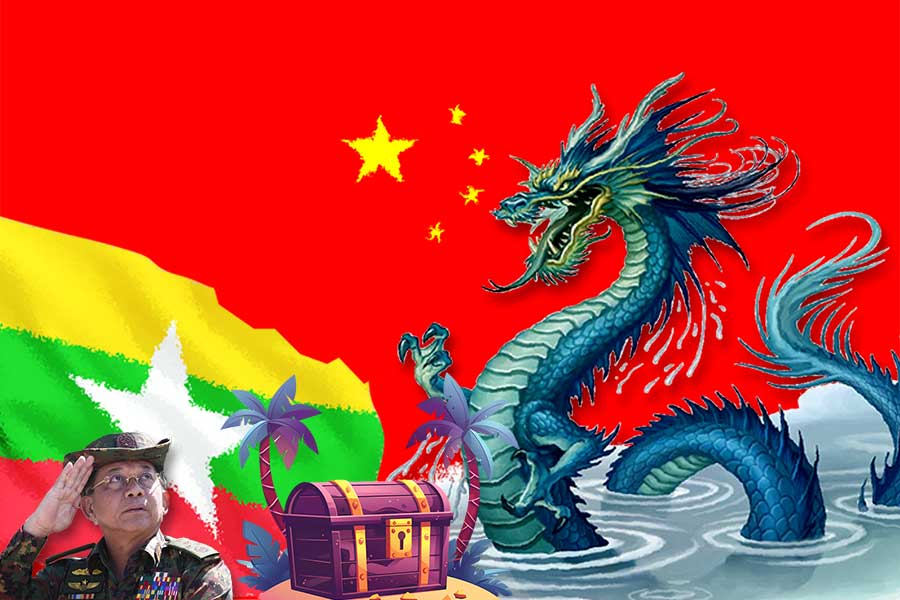- Junta claims over 24 million ballots cast in 2025 poll, cites strong youth turnout
- ULA expands HIV prevention, healthcare services for sex workers in AA-held areas
- Over 600 Mro villagers displaced in Maungdaw amid threats from ARSA, RSO
- Clashes continue in Sittwe as junta reinforces naval, armored deployment
- Arakan Army signals willingness to forge strategic partnership with Bangladesh’s new government
Editorial: Blood, Treasure and China in Myanmar
China has a veritable treasure trove in Myanmar. It is not a treasure trove of gold and silver typical of an adventure story. Located in Arakan State in western Myanmar, the treasure trove provides Beijing with direct access to the Indian Ocean and potential economic prosperity.
24 Jul 2024

China has a veritable treasure trove in Myanmar. It is not a treasure trove of gold and silver typical of an adventure story. Located in Arakan State in western Myanmar, the treasure trove provides Beijing with direct access to the Indian Ocean and potential economic prosperity.
Junta boss Min Aung Hlaing has been making desperate efforts to convince Beijing of his ability to protect that treasure trove.
In Arakan State’s Kyaukphyu Township, the site of major China-backed projects, the regime has banned locals from travelling in the waters for two-and-a-half months, from July 15 to September 30, purportedly to make way for oil tankers.
The junta chief is determined to win the trust of the Red Dragon at all costs, without care for the livelihoods of those like local fishermen on Made Island. He apparently believes that China would wield its power to salvage him from the dire consequences of his mistakes if Beijing still considers him the best guard for its treasure trove.
Beijing has provided patrol boats to the regime and mediated talks between the junta and ethnic armed organisations in consideration of its Kyaukphyu special economic zone (SEZ) and deep-sea port project in Arakan State, which has significant potential to help expand its treasure trove.
The Brotherhood Alliance had made sweeping gains during three months of its anti-regime “Operation 1027” in northern Shan State before a China-brokered ceasefire halted the fighting in mid-January. The regime might have ceded more territory had it not been for the truce.
Renewed fighting erupted on June 25 as the regime had carried out attacks in violation of the ceasefire. The China-brokered ceasefire has collapsed, and the second phase of Operation 1027 is ongoing.
The regime knows that it was its mistake that led to the collapse of the ceasefire. To appease China, Min Aung Hlaing on July 8 declared the Chinese New Year a national holiday in Myanmar, explaining that Myanmar wants to deepen ties with China.
But instead of inviting the Myanmar junta boss, last month Beijing hosted ex-president Thein Sein, who was reportedly asked to persuade Min Aung Hlaing to abdicate his position and form an interim government to pave the way for a poll.
Beijing apparently worries that Min Aung Hlaing may no longer be the best protector of its treasure trove in Myanmar.
The country has been in turmoil since Min Aung Hlaing seized power in a coup more than three years ago. The regime is still struggling to restore order, and indeed in places like Arakan State it appears on the verge of losing complete control. Anti-regime forces have seized at least 61 towns since November of last year, a fact that might be undermining Beijing’s trust in Min Aung Hlaing’s ability to lead — and protect its interests.
Myanmar’s military regime is “trying to destroy a country it cannot control,” the UN special rapporteur for human rights in the country, Tom Andrews, said on July 11. His remarks brought into stark relief Min Aung Hlaing’s shortcomings and brutality.
China is nervous, and it remains to be seen whether Min Aung Hlaing will listen to calls to cede power to an interim government, as reportedly recently conveyed to his former president Thein Sein. The alternative, it seems, would be for the commander-in-chief to continue to pretend that he has the situation under control.







.jpg)












